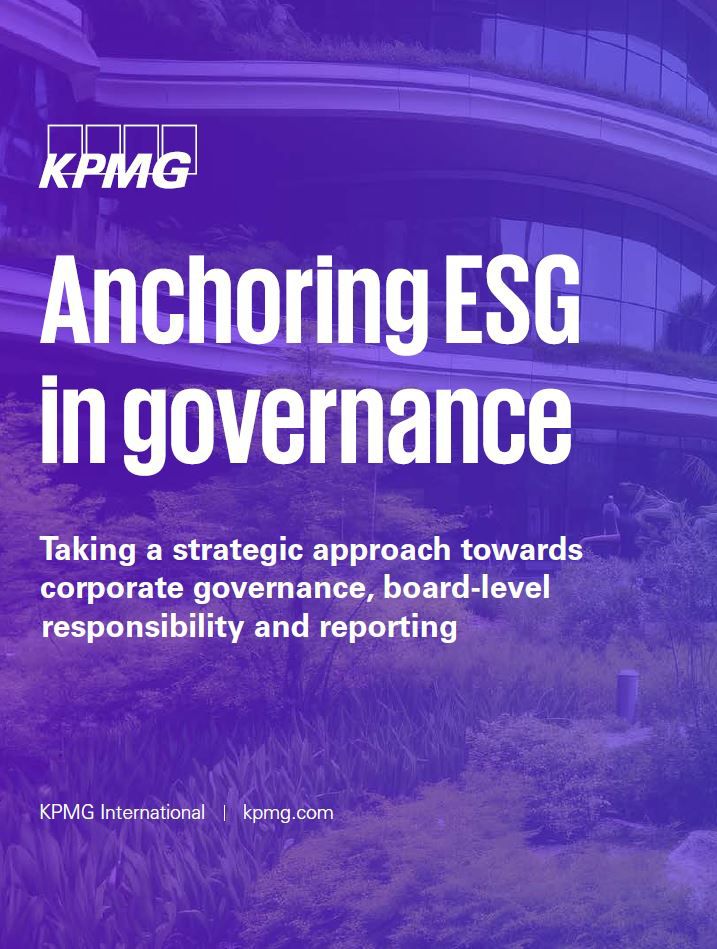“Companies need to take a holistic approach and integrate sustainability into their business models”
Meet Moa Cedhamre, Sustainability Advisor who drives the sustainability business agenda forward. This is her view on how companies can find the right balance between ambition and value creation on their sustainability transformation journey.
What does Sustainability transformation mean to you?
It is about future-proofing your company and meeting the increasing demand from customers, employees, and investors when it comes to improving transparency and meaningful sustainability performance. It means that companies need to take a holistic approach and integrate sustainability into their business models, risk processes, strategies, and target setting. Sustainability is not a single entity issue any more.
"Sustainability is not a single entity issue any more."


What are some of the challenges clients face when they undertake sustainability transformation? And how can KPMG help?
I think one of the biggest challenges for companies today is setting the right level of ambition and create value whilst navigating the complexity, cost, regulatory requirements, and reliability of committing to sustainable transformation. And of course, knowing where to start.
A sustainability transformation is no small task. The effort it takes, and the significance of its outputs, will very much depend on your overall ambition. Do you just want to be “compliant with regulation” or do you want to use the opportunity as a strategic value creation lever? Here is where you need to start the journey.
When you have set your ambition, you need to identify which sustainability topics that are of material importance to your company, which are also required by the new sustainability disclosure regulation, CSRD.
The next step, when you have identified your material areas, is to set your strategies for the coming years. Device a roadmap of where you are today and where you want to go, what you want to represent and how to get there. You need to understand how you will approach subjects as climate risks and opportunities, circularity business models, supply chain accountability, future of governance and reliable data to name a few.
Once you have set a clear course of the road ahead you will be in a much better position to drive the implementation of your sustainability transformation by developing functional targets and action plans, by implementing or updating reporting systems and monitoring mechanisms, and re-designing governance to enable effective management and integration into everyday operations.
KPMG is a great partner to team up with when embarking on your transformation journey as we can support companies through every step of the process. We have extensive expertise, global reach and partnerships, and can provide and a comprehensive approach to addressing all strategic aspects of the transformation journey.
How important is it for businesses a to make a sustainability transformation and why?
Companies need a sustainability transformation because it ensures resilience for the future, meets stakeholder expectations, cuts costs through efficiency, ensures compliance with regulations, opens new market opportunities, reduces risks, and allows businesses to make a positive impact on the world. It's not just about doing what's right; it's a strategic necessity for long-term success.
Can you give us an example of how solid work with sustainability can provide growth for organizations?
In today's business landscape, integrating sustainability measures has become a strategic must for organizations seeking long-term growth and resilience. Take, for instance, a manufacturing company embracing sustainable practices. By investing in renewable energy sources, optimizing production processes to minimize waste, and sourcing from eco-conscious suppliers, it can experience multifaceted growth.
Firstly, cost savings can be made through reduced energy expenses and optimized processes. This not only positively impacts the bottom line but also signifies operational efficiency and responsible resource utilization.
Secondly, the long-term viability of the business is assured by responsibly sourcing materials and securing supply chains against future resource scarcity and price fluctuations.
By adhering to sustainable practices, the company also ensures regulatory compliance and mitigates risks, protecting its reputation and finances.
Engagement with employees is another key aspect. Fostering a culture of sustainability within the organization boosts morale, attracts top talent, and aligns the workforce with the company's values.
Finally, appealing to investors seeking social and environmental responsible opportunities is essential. Demonstrating a commitment to sustainability not only enhances the company's attractiveness but also opens doors to funding and partnerships that align with its ethical stance.
To sum up, integrating sustainable practices isn't merely about ethical and environmental management; it's essential for holistic organizational growth, resilience, and future success.
Why would a client choose to work with KPMG in their sustainability transformation?
KPMG is a good partner to work with because we bring expertise that spans over both environmental, social, and governance aspects. Our comprehensive approach considers sustainability holistically, aligning with evolving stakeholder expectations. We offer innovative solutions, integrating them into core business strategies. Our focus on transparent reporting, risk management, and compliance ensures credible and impactful sustainability transformations.
 "
"
Anchoring ESG in governance
Sustainability is growing in strategic importance for companies, with increasing reporting requirements on environmental, social and governance (ESG) as well as other demands on corporate structures regarding sustainability.
Download report >
Meet the sustainability experts
This is what we can do for you
Talk to us about sustainability
Amanda Abele
Manager, Strategy & Operations
KPMG in Sweden
Christopher Larsson
Senior Manager, Assurance & Sustainability Services
KPMG in Sweden
Nazrin Huseinzade
Manager, Legal Services
KPMG in Sweden



